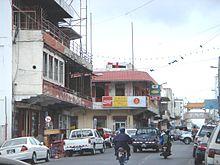| Chinatown | |||||||
|---|---|---|---|---|---|---|---|
 Port Louis Chinatown | |||||||
| Chinese | 唐人街 | ||||||
| |||||||
| Alternative Chinese name | |||||||
| Traditional Chinese | 中國城 | ||||||
| Simplified Chinese | 中国城 | ||||||
| |||||||
| Second alternative Chinese name | |||||||
| Traditional Chinese | 華埠 | ||||||
| Simplified Chinese | 华埠 | ||||||
| |||||||
This article discusses Chinatowns in Africa. There are least three major Chinatowns in Africa.
As former colonies of Europe, the coastal African nations of Madagascar, Mauritius, and South Africa were the main receiving points of Chinese immigrants from the 1890s to the early part of the 20th century. The early Chinese arrived to labour in the Transvaal gold mines of South Africa and on the Tananrive Tamatave railway of Madagascar. Many of these Chinese immigrants were exploited.
Today, South Africa remains the top African destination for first-generation Chinese-speaking immigrants.
Madagascar
Madagascar has received some Chinese immigrants. In Madagascar, there are about 30,000 Chinese, the majority of them came from the Pearl River Delta in Guangdong. A Chinatown, called Quartier chinois, is located in Antananarivo.
Mauritius
The Chinatown or Quartier chinois is in the city of Port Louis on rue Royale. The Hakka Chinese are the dominant group in Mauritius. Its Chinatown was founded in 1944. The Chinatown of Port Louis hosts a very popular "Chinese Food and Cultural Festival" every year, which is appreciated by all Mauritians in general.
Morocco
The sole and quickly growing Chinatown of North Africa is the Quartier chinois located on rue Mohamed Ben Ahmed Lekrik in the Derb Omar district of Casablanca. Many immigrants in Casablanca's Chinatown engage in the wholesale apparel businesses, selling fair-quality products at low prices.
Nigeria
China Town, a Chinese-dominated business arena in the Ojota area of Lagos. The giant shopping centre, which sits on an expanse of land measuring 20,000 square metres, will no longer be for only economic activities. It will also help facilitate robust bilateral relationships between Nigerians and the Chinese people.
South Africa
Inner-city Johannesburg has a declining Chinatown on Commissioner Street, but a newer Chinatown can be found on Derrick Avenue in the hilly suburb of Cyrildene. Most of the inhabitants of the Cyrildene Chinatown are recent immigrants from mainland China.[1]
In the late 1970s and throughout the 1980s immigrants from Taiwan settled extensively in South Africa.[2] South Africa's first Taiwan-born legislator was elected in the 1980s. After South Africa recognised the People's Republic of China in 1998 large numbers of mainland Chinese immigrated to the country. South African Chinese are dispersed throughout South African cities. During the Apartheid regime (1948–93) Chinese South Africans were classified as "Coloureds" or "Asian South Africans", while certain East Asian nationals (such as Japan and Taiwan) in South Africa were declared honorary whites and thus avoided most forms of official discriminatory laws (they could live in reserved white neighborhoods unlike native/black, and Asian-Indian South Africans), since Apartheid created a strict racial segregation system for non-white/European persons (esp. the black majority) in South Africa.
References
- ^ John Matshikiza (Jan 22, 2007). "Hoe's my China nou?". Mail and Guardian Online. Retrieved June 1, 2011.
- ^ Yap, Melanie; Leong Man, Dainne (1996). Colour, Confusion and Concessions: The History of the Chinese in South Africa. Hong Kong: Hong Kong University Press. p. 427. ISBN 962-209-423-6.
External links
- Antananrivo Chinatown Gallery Some photos of Antananrivo's Chinatown
- Johannesburg Chinatowns
- My Johannesburg: The original Chinatown, interview with Ufrieda Ho, Aug 20 2011.

